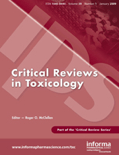
CRITICAL REVIEWS IN TOXICOLOGY
Scope & Guideline
Driving Knowledge Forward in the Realm of Toxicology
Introduction
Aims and Scopes
- Chemical Risk Assessment:
The journal emphasizes the evaluation of health risks associated with various chemicals, including pharmaceuticals, pesticides, and environmental pollutants, through methods such as systematic reviews and meta-analyses. - Mechanistic Toxicology:
There is a strong focus on understanding the mechanisms of toxicity, including cellular and molecular pathways, to inform risk assessment and regulatory decisions. - Epidemiological Studies:
The journal publishes reviews that assess epidemiological evidence linking chemical exposure to health outcomes, providing insights into public health implications. - Innovative Methodologies:
Critical Reviews in Toxicology highlights the application of new approaches and technologies in toxicology, including in vitro models, computational methods, and biomonitoring techniques. - Interdisciplinary Approaches:
The journal integrates insights from various scientific disciplines, including biology, chemistry, environmental science, and public health, to provide a holistic view of toxicological issues. - Regulatory Frameworks:
The journal discusses the implications of toxicological research for regulatory practices, including the assessment of occupational exposure limits and environmental safety standards.
Trending and Emerging
- In Vitro and Alternative Testing Methods:
There is a growing emphasis on in vitro methods and alternative testing strategies, driven by the need to reduce animal testing and improve the efficiency of toxicity assessments. - Neurodevelopmental Toxicity:
Research focusing on neurodevelopmental impacts of chemical exposures, particularly in vulnerable populations such as children, has gained traction, reflecting societal concerns about environmental health. - Integrative Toxicology Approaches:
Emerging themes highlight the integration of various data types, including omics data, computational modeling, and epidemiological evidence, to provide a comprehensive understanding of chemical risk. - Microbial and Environmental Toxicology:
There is an increasing interest in the effects of environmental pollutants on microbial communities and ecosystems, as well as their implications for human health. - Health Effects of Emerging Contaminants:
The journal is responding to the growing concern regarding emerging contaminants, such as microplastics and novel psychoactive substances, with dedicated reviews addressing their toxicological profiles and health risks.
Declining or Waning
- Traditional Animal Testing:
There is a noticeable reduction in publications focusing solely on traditional animal testing methods, as the field moves towards alternative testing strategies and in vitro methodologies. - Historical Toxicological Studies:
Papers centered on historical toxicological data or retrospective analyses have decreased, indicating a shift towards more contemporary and relevant studies that directly inform current regulatory practices. - General Toxicity Assessments:
Reviews that provide general overviews of toxicity without specific focus on mechanisms, applications, or regulatory implications are becoming less common, as the journal increasingly favors detailed and targeted analyses. - Single Compound Studies:
The focus on studies examining the toxicity of single compounds without considering interactions or combined exposures is waning, as there is a growing recognition of the importance of understanding cumulative and synergistic effects.
Similar Journals
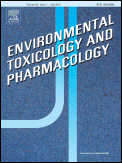
Environmental Toxicology and Pharmacology
Illuminating the science behind pollutants and health.Environmental Toxicology and Pharmacology, published by Elsevier, is a leading journal dedicated to advancing our understanding of the effects of environmental pollutants on biological systems. With an ISSN of 1382-6689 and an E-ISSN of 1872-7077, this journal covers a wide range of studies related to toxicology, pharmacology, and environmental health. The journal is classified as Q2 in key categories such as Health, Toxicology and Mutagenesis and Medicine (miscellaneous), and sits impressively in Q1 for Toxicology, reflecting its strong impact in the field. As of 2023, it ranks #30 out of 133 in Toxicology and #40 out of 148 in Health, indicating its high relevance and contribution to research. While the journal is not currently open access, it remains a pivotal resource for researchers, professionals, and students seeking to explore the intricacies of environmental health effects. Its commitment to publishing high-quality peer-reviewed research positions it as a crucial platform for scientific dialogue and discovery.

International Journal of Occupational Medicine and Environmental Health
Pioneering studies that shape the future of occupational medicine.The International Journal of Occupational Medicine and Environmental Health is a distinguished journal dedicated to advancing the fields of occupational medicine and environmental health. Published by NOFER Institute of Occupational Medicine in Poland, this open-access journal has been providing a platform for innovative research since 2011. With an ISSN of 1232-1087 and an E-ISSN of 1896-494X, it allows for wide dissemination of findings that address contemporary challenges in public health, occupational settings, and environmental issues. The journal has established itself as a vital resource, achieving a Q3 ranking in both Medicine (miscellaneous) and Public Health, Environmental and Occupational Health categories as of 2023, reflecting its commitment to quality and relevance. With a Scopus rank of #295 out of 665 in its domain, it places in the 55th percentile, affirming its growing impact within the scientific community. Researchers, professionals, and students seeking to enhance their knowledge and contribute to the discourse will find the rich content and comprehensive studies presented in this journal invaluable. Explore cutting-edge research from 1994 to the present, and join the conversation on occupational and environmental health issues that profoundly affect global communities.
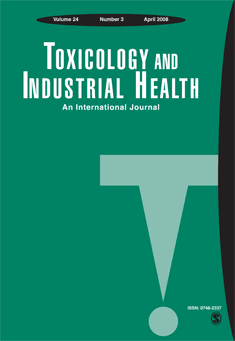
TOXICOLOGY AND INDUSTRIAL HEALTH
Fostering a safer tomorrow through comprehensive toxicology research.TOXICOLOGY AND INDUSTRIAL HEALTH, published by SAGE PUBLICATIONS INC, is a premier journal in the field of toxicology, public health, and environmental health, with a significant history dating back to 1985. With its ISSN 0748-2337 and E-ISSN 1477-0393, the journal provides a platform for disseminating groundbreaking research and comprehensive reviews that address the complexities of toxic substances in industrial and occupational settings. Despite its Q3 ranking among peers in health, toxicology, and public health, this journal is becoming increasingly influential, reflected in its growing citation metrics. Researchers and professionals benefit from its commitment to fostering knowledge in both theoretical and practical contexts, making it an essential resource for those dedicated to advancing understanding in this vital field. The journal's main objectives include promoting research addressing the implications of toxicology on health and safety standards across industries, ensuring accessibility to current studies for a global audience. Overall, TOXICOLOGY AND INDUSTRIAL HEALTH plays a critical role in bridging the gap between research and real-world applications, proving invaluable to students, professionals, and researchers alike in their pursuit of enhancing public health and environmental safety.
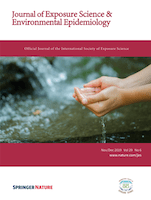
Journal of Exposure Science and Environmental Epidemiology
Bridging the Gap Between Environment and Public HealthJournal of Exposure Science and Environmental Epidemiology, published by SPRINGERNATURE in the United Kingdom, is a leading platform for researchers and practitioners dedicated to understanding the interplay between environmental factors and human health. With an impressive impact factor and Q1 and Q2 rankings across multiple categories such as Pollution and Public Health, the journal has established itself as a critical resource in the fields of epidemiology, toxicology, and environmental science. Covering a wide spectrum of studies from 2006 to 2024, it aims to disseminate timely research that empowers professionals and informs policy decisions. Although there is no open access option at this time, the journal's rigorous peer-review process ensures that only high-quality research is published, further cementing its reputation as a vital source of knowledge for advancing public health and environmental protection.
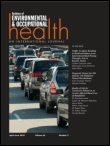
Archives of Environmental & Occupational Health
Transforming research into actionable insights for a safer world.Archives of Environmental & Occupational Health is a prestigious journal published by Routledge Journals, Taylor & Francis Ltd, dedicated to advancing research and knowledge in the realms of environmental science, occupational health, and toxicology. With an ISSN of 1933-8244 and an E-ISSN of 2154-4700, this peer-reviewed journal has gained significant recognition, currently holding a Q2 ranking in Environmental Science and Q3 rankings in Health, Toxicology and Mutagenesis, and Public Health. Established in 2005, it serves as a vital platform for researchers, practitioners, and policymakers alike who aim to address and disseminate findings on pressing environmental and occupational health issues. The journal is not open access, allowing for rigorous peer review processes while still reaching a broad readership. As it converges through 2024, the Archives of Environmental & Occupational Health continues to play a critical role in shaping discourse and fostering innovation in the field, making it an essential resource for those committed to improving both human health and the environment.

Environmental Health
Exploring the Impact of Environment on Public Well-BeingEnvironmental Health is a premier, peer-reviewed journal dedicated to advancing knowledge in the interdisciplinary field of environmental health. Published by BMC since 2002, this Open Access journal aims to disseminate impactful research that addresses the critical intersections between environmental factors and public health. With its impressive stature as a Q1 journal in key categories, including Health, Toxicology and Mutagenesis, Medicine (miscellaneous), and Public Health, Environmental and Occupational Health, it ranks within the top tier of its field, boasting significant visibility and a high impact factor as demonstrated by Scopus rankings. Scholars and practitioners alike benefit from its well-rounded approach and commitment to bridging science and policy, making it essential reading for anyone invested in understanding and mitigating environmental health risks. The journal is based in the United Kingdom, with a focus on promoting global accessibility to its findings.

Exposure and Health
Bridging disciplines for a healthier, safer world.Exposure and Health is a pioneering journal published by Springer, specializing in the interdisciplinary fields of health, toxicology, and environmental sciences. With an ISSN of 2451-9766 and E-ISSN of 2451-9685, this open-access journal exemplifies a commitment to disseminating high-quality research that informs public health practices and policies globally. Situated in the Netherlands, it boasts an impressive impact factor and ranks in the top quartile (Q1) across multiple categories in the 2023 Scopus rankings, including Health, Toxicology and Mutagenesis, Pollution, and Water Science and Technology. The journal is dedicated to advancing knowledge on the interactions between environmental factors and health outcomes, making it a vital resource for researchers, professionals, and students in these critical fields. Exposure and Health actively encourages submissions that address the challenges of exposure assessment, risk management, and the promotion of sustainable public health initiatives.
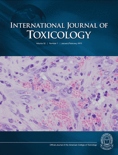
INTERNATIONAL JOURNAL OF TOXICOLOGY
Illuminating the Pathways of Toxicology Research since 1982.The International Journal of Toxicology, published by SAGE Publications Inc, serves as a cornerstone of scholarly research in the field of toxicology, with an established history dating back to 1982. This esteemed journal, ISSN 1091-5818 and E-ISSN 1092-874X, functions within the Q3 quartile in Toxicology, ranking 94 out of 133 in the Pharmacology, Toxicology and Pharmaceutics category per Scopus metrics, reflecting its commitment to advancing scientific understanding in this critical area. The journal not only aims to disseminate high-quality research but also encourages open access to vital studies, thus fostering collaboration and innovation among researchers, professionals, and students alike. With a focus on various aspects of toxicology, including but not limited to environmental, clinical, and molecular toxicology, the International Journal of Toxicology is dedicated to bridging gaps in toxicity research and promoting safe practices across numerous disciplines. As it converges towards 2024, the journal continues to play a vital role in shaping the discourse surrounding the implications of exposure to toxic substances in human health and the environment.
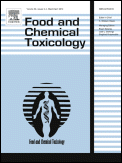
FOOD AND CHEMICAL TOXICOLOGY
Transforming toxicology knowledge into actionable insights.FOOD AND CHEMICAL TOXICOLOGY, published by Pergamon-Elsevier Science Ltd, is a prestigious journal with a significant impact in the fields of food science, medicine, and toxicology, reflecting its Q1 and Q2 quartile rankings in various categories as of 2023. Established in 1982, this journal continues to serve as an essential platform for disseminating high-quality research focused on the toxicological assessment of foods and chemicals, aiming to advance knowledge that affects public health and safety. With a pivotal role in integrating diverse disciplines, including pharmacology and agricultural sciences, the journal ranks impressively within the top percentiles—specifically 95th in Toxicology and 92nd in Food Science on the Scopus metrics. Though it operates on a traditional subscription model, the journal is committed to providing valuable insights and findings to researchers, professionals, and students across the globe, making it a vital resource in the ongoing discourse around food safety and environmental health. Its comprehensive scope underscores its importance in shaping evidence-based policies and practices.
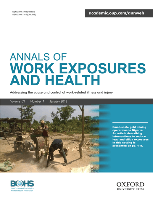
Annals of Work Exposures and Health
Empowering public health through rigorous scholarship.Annals of Work Exposures and Health, published by Oxford University Press, stands as a leading journal dedicated to the field of public health with a particular focus on environmental and occupational health issues. Since its inception in 2016, the journal has provided a robust platform for disseminating high-quality research, boasting an impressive impact factor that reflects its rigorous peer-review process and significant contribution to advancing knowledge in the field. With its open access model, the journal ensures that critical findings are readily available to researchers, professionals, and students, fostering a collaborative spirit in tackling the challenges associated with work-related health exposures. As of 2023, it ranks in Q2 in its category, positioned within the 69th percentile in Scopus, illustrating its influence and relevance in the ongoing discourse surrounding occupational health. The Annals continues to attract diverse contributions that aim to inform policy and practice, making it an essential resource for anyone involved in public health research and advocacy.